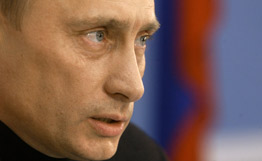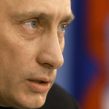
PUTIN’S NEW DEAL: KREMLIN PLAYS UP NATIONALIST CARD
Publication: Eurasia Daily Monitor Volume: 3 Issue: 93
By:

The annual address Russian President Vladimir Putin gave to the Federal Assembly on May 10 has already been billed by some Kremlin spin-doctors as Russia’s version of the New Deal — the set of policies pursued by Franklin D. Roosevelt in the wake of the Great Depression. What is more remarkable, though, is that the long-term political course announced by the Russian leadership is markedly nationalist and non-liberal — if not outright anti-liberal. It appears to be based on Moscow’s deep disillusionment with the dialog with the West, formidable financial resources generated by the windfall energy revenues, and the seemingly broad public demand for policies inspired by “national egotism.”
Most analysts agree that Putin’s state of the nation address was rather skillfully crafted. The speech projects the image of a future Russia that is a strong country in which the powerful military-industrial complex coexists harmoniously with robust social policy. As a number of observers have correctly remarked, such an image embodies the average Russian’s dream: a desire to see his or her country among the main world powers and, simultaneously, have the state take care of the citizens’ growing social demands. Indeed, as polls conducted by the independent Levada Center demonstrate, the priorities set forth in Putin’s speech quite neatly correspond with the priorities advanced by the majority of the Russian people.
Thus, it is not for nothing that the presidential address has focused on two key social issues: the state of the country’s demography and the state of its armed forces. Both family and army are highly conservative social institutions and traditionally generate quite a large amount of nationalist sentiment. Both possess significant real as well as symbolic value in the eyes of the populace.
In this sense, the overall tone of Putin’s speech was clearly nationalistic, which was further amplified by the purposeful quotations borrowed from the works of Russian nationalist thinkers ranging from the liberal Dmitry Likhachev to conservative nationalists such as the philosopher Ivan Ilyin and the author Alexander Solzhenitsyn. As one knowledgeable Kremlin aide remarked, “Such quotes just cannot be accidental.”
The principal target of Putin’s eloquence was thus his domestic audience. In the words of one high-profile “political technologist,” it was the first time that Putin said so bluntly that his policy is “dictated by the priorities of the Russian (rossiiskaya) nation and the Russian (russky) people.” One has to realize, the Kremlin pundit continues, that it is the Russian nation that creates and supports the Russian state. Hence, the priorities of “Russian democracy” should be adjusted accordingly: first, the nation, and then the state.
To be sure, the Kremlin strategists who drafted the presidential address were likely guided by some very pragmatic considerations. Russia’s severe demographic crisis is an issue that has increasingly been raised by Russian nationalist groupings not fully beholden to the Kremlin — such as, for example, the Rodina party. As the problem of demographic decline and a plummeting fertility rate possesses a significant electoral potential, administration pundits appear to have realized that they have to prevent the president’s most dangerous political opponents from taking advantage of the explosive issue only a year before parliamentary elections.
The very fact that Putin’s speech all but ignored foreign policy speaks volumes regarding the degree of the Kremlin’s displeasure with the West’s treatment of Russia. Of course, he disdainfully mentioned “Comrade wolf” (i.e., the United States) and its high-handed international behavior — a kind of “asymmetrical” response to Washington’s annoying lecturing on democracy, most recently by U.S. Vice President Dick Cheney. Symptomatically, however, instead of giving Russia’s detractors a tough riposte, Putin chose — obviously seeking to appeal to Russians’ nationalist feelings — to pass the Western critics by in contemptuous silence. This tactic, some Russian commentators were quick to note, allowed Putin to make Cheney look “somewhat comical, like a man yelling something to a train that has long left the station.” By all appearances, the Kremlin thought this would be the best way to demonstrate Moscow’s geopolitical self-assurance. Indeed, the argument goes, why should the Russian president, who is presiding over a booming economy — Russia earned around $113 billion from oil exports last year and a further $30 billion from natural gas exports — stoop to react to the complexes of the Western policymakers who cannot adjust themselves to the newly assertive Russia?
But the presidential address made it perfectly clear that Russia will continue pursuing an independent foreign policy course. It will also continue to battle any possible infringement on what it perceives to be its sphere of “vital national interests.”
That said, the one big question still looms large: whether Putin’s ambitious nationalist course is feasible. Three aspects make it look questionable. First is the unhealthy nature of the current Kremlin management of the economy, where private and public interests merge in an opaque and, possibly, criminal way. Second, the ongoing centralization and the creation of the huge state-run conglomerates enhance the role of the bureaucracy, which is notoriously corrupt. Third, Putin’s nationalist “New Deal” is effectively a race against time, as it hinges on the currently sky-high energy prices — a foundation that could prove to be quite shaky.
(Vedomosti, Rossiiskaya gazeta, Izvestiya, Nezavisimaya gazeta, Kreml.org, Russia Profile, May 11; Kremlin.ru, RIA-Novosti, Gazeta.ru, Politicom.ru, May 10)




